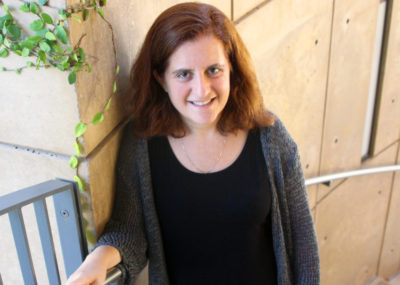Stanford Law’s Anne Joseph O’Connell Appointed by Biden Administration to Council of the Administrative Conference of the United States
On September 27th, 2022, President Biden appointed Anne Joseph O’Connell, Adelbert H. Sweet Professor of Law at Stanford Law School, to the Council of the Administrative Conference of the United States (ACUS). ACUS is an independent, non-partisan federal agency within the executive branch dedicated to improving administrative law and federal regulatory processes. ACUS has been important in increasing the success and fairness of the legal administrative process in the United States by proposing hundreds of recommendations, reports, guides, and forums. O’Connell will work on the council alongside the ACUS chairman, Andrew Fois, and nine other appointed members. As a member of the council, O’Connell advises the Chairman and the agency on administrative law topics and provides feedback and recommendations on the Conference’s work. She will serve a three-year term.

“I am excited to continue working with ACUS in this new role,” said O’Connell. “I am especially thrilled to be working alongside Funmi Olorunnipa Badejo, a former student of mine!”
“Anne is one of the country’s foremost scholars in the area of administrative law and the federal regulatory process,” said Jenny Martinez, the Richard E. Lang Professor of Law and Dean of Stanford Law School. “She has devoted much of her career to the development of innovative, sophisticated frameworks for improving how our government agencies function. Anne brings an exceptional set of talents to this important role and her deep knowledge aligns perfectly with the goals and mandates of ACUS.”
About Anne Joseph O’Connell
Anne Joseph O’Connell is a lawyer and social scientist whose research and teaching focuses on administrative law and the federal bureaucracy. Outside of the law school and ACUS, she is a contributor to the Center on Regulation and Markets at the Brookings Institution. O’Connell is an elected fellow of the American Academy of Arts and Sciences and the National Academy of Public Administration and an elected member of the American Law Institute. She frequently consults with congressional staff, non-profit organizations, and others, and has testified in front of Congress.
O’Connell has written on a number of topics, including agency rulemaking, the selection of agency leaders, and bureaucratic organization (and reorganization). Her publications have appeared in leading law and political science journals. In addition to empirical reports for the Brookings Institution, she has issued several studies with the Center for American Progress. O’Connell is currently working on a book, Stand-Ins, on temporary leadership in government, business, and religion.
O’Connell’s research has received a number of awards. She is a three-time recipient of the American Bar Association’s Scholarship Award in Administrative Law for the best article or book published in the preceding year—for her 2020 article “Actings” (co-winner), her 2014 article “Bureaucracy at the Boundary,” and her 2009 article “Vacant Offices: Delays in Staffing Top Agency Positions.” She is also a two-time winner of the Richard D. Cudahy Writing Competition on Regulatory and Administrative Law from the American Constitution Society—for her article “Actings” (co-winner in 2020) and for her co-authored article (with Farber) “The Lost World of Administrative Law” (2014). Her article “Political Cycles of Rulemaking” was the top paper selected by the Association of American Law Schools’ 2007-2008 Scholarly Papers Competition for early career faculty members. In addition, her research has been cited by Congress, the Supreme Court, the D.C. Circuit, and the Ninth Circuit, and it has been featured in the Washington Post and other national media.
At Stanford Law School, O’Connell teaches administrative law, advanced administrative law, and constitutional law. The class of 2020 chose her to receive the Hurlbut Award, which is given annually to one professor “who strives to make teaching an art.” She currently co-chairs the school’s efforts to improve teaching and classroom climate and co-chairs the steering committee for Stanford University’s Faculty Women’s Forum, which works to enable all women faculty to thrive. Prior to joining Stanford University in 2018, O’Connell was the George Johnson Professor of Law at the University of California, Berkeley. While there, she received the Distinguished Teaching Award (the campus’s most prestigious honor for teaching) in 2016 and Berkeley Law’s Rutter Award for Teaching Distinction in 2012. From April 2013 to July 2015, she served as associate dean for faculty development and research under three different deans. In 2013-2014, O’Connell was co-president of the Society for Empirical Legal Studies (co-organizing the 2014 Conference on Empirical Legal Studies).
Before joining the Berkeley Law faculty in 2004, O’Connell clerked for Justice Ruth Bader Ginsburg of the U.S. Supreme Court during the October 2003 term. From 2001 to 2003, she was a trial attorney for the Federal Programs Branch of the U.S. Department of Justice’s Civil Division, where she received special commendation for her work. She clerked for Judge Stephen F. Williams of the U.S. Court of Appeals for the D.C. Circuit from 2000 to 2001. A Truman Scholar, O’Connell worked for a number of federal agencies in earlier years. She is a member of the New York bar and served as a volunteer for the Biden-Harris Campaign’s policy team.
About Stanford Law School
Stanford Law School is one of the nation’s leading institutions for legal scholarship and education. Its alumni are among the most influential decision makers in law, politics, business and high technology. Faculty members argue before the Supreme Court, testify before Congress, produce outstanding legal scholarship and empirical analysis, and contribute regularly to the nation’s press as legal and policy experts. Stanford Law School has established a new model for legal education that provides rigorous interdisciplinary training, hands-on experience, global perspective and focus on public service, spearheading a movement for change.
